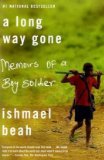Summary | Excerpt | Reading Guide | Reviews | Beyond the Book | Readalikes | Genres & Themes | Author Bio

Memoirs of a Boy Soldier
by Ishmael Beah
Two days after that visit, we had left home. As we now stood at the wharf in
Mattru Jong, I could visualize my father holding his hard hat and running back
home from work, and my mother, weeping and running to my little brother’s
school. A sinking feeling overtook me.
Junior, Talloi, and I jumped into a canoe and sadly waved to our friends as
the canoe pulled away from the shores of Mattru Jong. As we landed on the other
side of the river, more and more people were arriving in haste. We started
walking, and a woman carrying her flip-flops on her head spoke without looking
at us: “Too much blood has been spilled where you are going. Even the good
spirits have fled from that place.” She walked past us. In the bushes along the
river, the strained voices of women cried out, “Nguwor gbor mu ma oo,” God help
us, and screamed the names of their children: “Yusufu, Jabu, Foday . . .” We saw
children walking by themselves, shirtless, in their underwear, following the
crowd. “Nya nje oo, nya keke oo,” my mother, my father, the children were
crying. There were also dogs running, in between the crowds of people, who were
still running, even though far away from harm. The dogs sniffed the air, looking
for their owners. My veins tightened.
We had walked six miles and were now at Kabati, Grandmother’s village. It was
deserted. All that was left were footprints in the sand leading toward the dense
forest that spread out beyond the village.
As evening approached, people started arriving from the mining area. Their
whispers, the cries of little children seeking lost parents and tired of
walking, and the wails of hungry babies replaced the evening songs of crickets
and birds. We sat on Grandmother’s verandah, waiting and listening.
“Do you guys think it is a good idea to go back to Mogbwemo?” Junior asked.
But before either of us had a chance to answer, a Volkswagen roared in the
distance and all the people walking on the road ran into the nearby bushes. We
ran, too, but didn’t go that far. My heart pounded and my breathing intensified.
The vehicle stopped in front of my grandmother’s house, and from where we lay,
we could see that whoever was inside the car was not armed. As we, and others,
emerged from the bushes, we saw a man run from the driver’s seat to the
sidewalk, where he vomited blood. His arm was bleeding. When he stopped
vomiting, he began to cry. It was the first time I had seen a grown man cry like
a child, and I felt a sting in my heart. A woman put her arms around the man and
begged him to stand up. He got to his feet and walked toward the van. When he
opened the door opposite the driver’s, a woman who was leaning against it fell
to the ground. Blood was coming out of her ears. People covered the eyes of
their children.
In the back of the van were three more dead bodies, two girls and a boy, and
their blood was all over the seats and the ceiling of the van. I wanted to move
away from what I was seeing, but couldn’t. My feet went numb and my entire body
froze. Later we learned that the man had tried to escape with his family and the
rebels had shot at his vehicle, killing all his family. The only thing that
consoled him, for a few seconds at least, was when the woman who had embraced
him, and now cried with him, told him that at least he would have the chance to
bury them. He would always know where they were laid to rest, she said. She
seemed to know a little more about war than the rest of us.
The wind had stopped moving and daylight seemed to be quickly giving in to
night. As sunset neared, more people passed through the village. One man carried
his dead son. He thought the boy was still alive. The father was covered with
his son’s blood, and as he ran he kept saying, “I will get you to the hospital,
my boy, and everything will be fine.” Perhaps it was necessary that he cling to
false hopes, since they kept him running away from harm. A group of men and
women who had been pierced by stray bullets came running next. The skin that
hung down from their bodies still contained fresh blood. Some of them didn’t
notice that they were wounded until they stopped and people pointed to their
wounds. Some fainted or vomited. I felt nauseated, and my head was spinning. I
felt the ground moving, and people’s voices seemed to be far removed from where
I stood trembling.
Excerpted from A Long Way Gone: Memoirs of a Boy Soldier by Ishmael Beah. Copyright © 2007 by Ishmael Beah. Published in February 2007 by Sarah Crichton Books, a division of Farrar, Straus and Giroux, LLC. All rights reserved.
Nearly all men can stand adversity, but if you want to test a man's character, give him power.
Click Here to find out who said this, as well as discovering other famous literary quotes!
Your guide toexceptional books
BookBrowse seeks out and recommends the best in contemporary fiction and nonfiction—books that not only engage and entertain but also deepen our understanding of ourselves and the world around us.